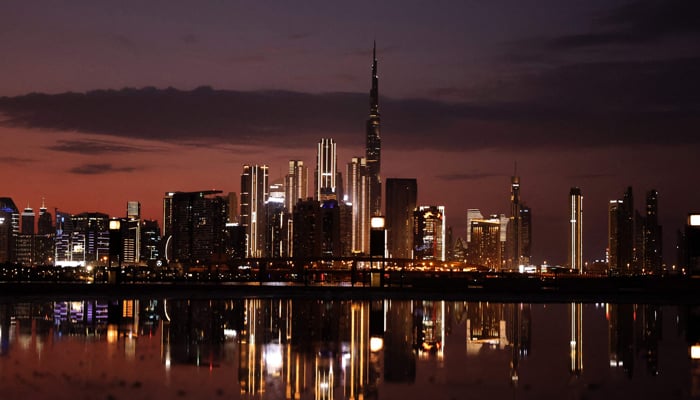The UAE’s success story
When the United Arab Emirates (UAE) observes its Founding Day on December 2, it will be celebrating an unusual success story in the Arab and Muslim world. The UAE’s population is just under 10 million of which 12 percent are Emiratis, but its impact on global affairs and its contribution to overall human accomplishment exceeds that of many larger countries.
Starting out as a union of seven not-so-well-known emirates in the Arabian desert 52 years ago, the UAE is now one of the world’s leaders in cutting-edge technology. It is the first Arab and Muslim country to launch a mission to Mars. The UAE ranks tenth in the Global Competitiveness Report 2023 by the World Economic Forum, which assesses the economic capacity of countries to compete globally.
The UAE also occupies first position in the Global Passport Power Rank Index 2023 and is one of the top ten donor states providing official development aid (ODA) to those living in less fortunate circumstances.
Its achievements are not just because of its oil wealth but the outcome of sensible policy choices by a succession of leaders committed to the vision of building a nation that is Muslim, modern, and moderate.
At the time of its independence, the UAE’s founding father, Sheikh Zayed bin Sultan Al-Nahyan, made two critical decisions that put the country on the path to success. The first was to shun political Islam and ensure that maintaining tradition would not come at the cost of embracing contemporary ideas. The second was to embrace a positive nationalism, based on shared aspirations, instead of the negative nationalism chosen by many post-colonial states, based on antagonism towards an enemy or adversary.
It is not the case that the UAE did not have disputes with other countries. Three of its islands were captured by Iran just as the British forces withdrew from the erstwhile Trucial States that emerged as the UAE in 1971. In addition, there were border demarcation disputes with Saudi Arabia and Oman, and the Pan-Arab sentiment of solidarity with the Palestinian people. But Sheikh Zayed, and his sons, Sheikh Khalifa bin Zayed and Sheikh Mohammed bin Zayed (the current president), did not allow these disputes to become obsessions obstructing pragmatic decision-making.
The UAE invested its oil wealth in its people by building world class infrastructure, healthcare facilities, and educational institutions. Education was a key priority from the beginning as Sheikh Zayed considered education as the way forward for creating an inclusive and prosperous society. In 1975, adult literacy stood at 58 per cent among men and 38 per cent among women. Today, literacy rates for both genders stands at 95 per cent.
The UAE’s investment in education and openness to learning and competing in the global marketplace has led to some of the world’s best universities establishing programs and campuses in the UAE. As a result, a less educated populace that lived in palm frond houses transformed into a highly educated and skilled population within a generation, working alongside large numbers of expatriates. The presence of citizens of 190 countries helped create a cosmopolitan outlook among Emiratis, in addition to helping the UAE take advantage of global talent in its own development.
Over the decades, the UAE has built a reputation as a country that values talent and has ended up attracting the world’s most skilled individuals, innovators, and creative minds. Around 44 billion in remittances annually are sent from the UAE to countries around the world, primarily in the Global South.
The top five recipient countries for remittances from the UAE in 2021 included India, Egypt, Pakistan, Bangladesh, and the Philippines with India receiving half of these annual remittances. These remittances are critical to the economies of these countries. As a MasterCard survey in 2022 showed, 51 per cent of UAE residents who sent money to family and friends believe they would have struggled financially without their support.
As an oil producing country, the UAE recognized its responsibility in embracing sustainability and environmentally friendly energy policies earlier than many others. In end-November 2023, the UAE will chair the United Nations Climate Change Conference or Conference of the Parties of the UNFCCC, commonly referred to as COP28, in Dubai.
The UAE has also become a global financial hub. According to the World Investment Report 2023 of the United Nations Conference on Trade and Development (UNCTAD), foreign direct investment inflows to the UAE in 2022 crossed $23 billion (AED83.5 billion). The UAE manages extensive investments abroad, totaling well over one trillion dollars through multiple sovereign wealth funds, as well as through several emirate-level, and government-related investment corporations.
The UAE has emerged as one of the few Muslim-majority countries that invested early and heavily in innovation, entrepreneurship, and technology. Vision 2021, National Advanced Sciences Agenda 2031 and Open Labs are policies launched by the UAE to support research and innovation in science and technology.
The UAE has its critics, especially in the Western world, but few would deny that it has become a model for religious inclusion in the region. Since 1971, the UAE government has demonstrated its commitment to inclusion, implementing laws that protect religious freedom and programmes that foster interfaith understanding. It is home to 40 churches and 700 ministries. In 2019, the UAE partnered with the UN’s heritage agency Unesco to restore Christian churches in Iraq destroyed by ISIS.
Two Hindu temples now operate in Dubai, and several cremation facilities in Abu Dhabi, Dubai and Sharjah provide Hindu burial rites. The UAE’s first Sikh temple opened in Dubai in 2012 and the country is also home to the Parsi, Baha’i, and Druze communities. The UAE’s economic success, technological ambitions, and its growing international influence are largely the outcome of the culture of tolerance fostered by its leaders and their preference for pragmatism over hardline ideologies.
The writer, former ambassador of Pakistan to the US, is Diplomat-in-Residence at the Anwar Gargash Diplomatic Academy in Abu Dhabi and Senior Fellow at the Hudson Institute in Washington DC.
-
 Shocking Details Emerge In Martin Short’s Daughter Katherine's Death Investigation: 'Kept To Herself'
Shocking Details Emerge In Martin Short’s Daughter Katherine's Death Investigation: 'Kept To Herself' -
 Yerin Ha On Stepping Into The Spotlight In Bridgerton Season Four
Yerin Ha On Stepping Into The Spotlight In Bridgerton Season Four -
 Nakiska Ski Area Avalanche Leaves Youth Unresponsive, Second Skier Escapes Unhurt
Nakiska Ski Area Avalanche Leaves Youth Unresponsive, Second Skier Escapes Unhurt -
 Igor Komarov Missing In Bali: Seven Foreign Suspects Arrested In Kidnapping Probe
Igor Komarov Missing In Bali: Seven Foreign Suspects Arrested In Kidnapping Probe -
 'I Swear' Director Kirk Jones Says Bafta Broadcast Mishap Failed Tourette’s Advocate
'I Swear' Director Kirk Jones Says Bafta Broadcast Mishap Failed Tourette’s Advocate -
 Yogurt Shop Murders Solved: 1991 Austin Cold Case Finally Linked To Serial Killer
Yogurt Shop Murders Solved: 1991 Austin Cold Case Finally Linked To Serial Killer -
 Iran Tensions Rise As Trump Says He Is 'not Thrilled' With Nuclear Negotiations
Iran Tensions Rise As Trump Says He Is 'not Thrilled' With Nuclear Negotiations -
 Where Is Calvin Klein's Wife Kelly Klein Now After Divorce And Fashion Fame?
Where Is Calvin Klein's Wife Kelly Klein Now After Divorce And Fashion Fame? -
 Kourtney Kardashian’s Role As Stepmother Questioned
Kourtney Kardashian’s Role As Stepmother Questioned -
 Neil Sedaka Dies At 86 After Hospitalisation In Los Angeles
Neil Sedaka Dies At 86 After Hospitalisation In Los Angeles -
 'Lizzie McGuire' Star Robert Carradine's Reason Of Death Laid Bare
'Lizzie McGuire' Star Robert Carradine's Reason Of Death Laid Bare -
 Lisa Rinna Breaks Silence After Recent Reunion With Andy Cohen: 'I've Pissed Him Off'
Lisa Rinna Breaks Silence After Recent Reunion With Andy Cohen: 'I've Pissed Him Off' -
 Savannah Guthrie Mom Update: Unexpected Visitors Spark Mystery Outside Nancy's Home
Savannah Guthrie Mom Update: Unexpected Visitors Spark Mystery Outside Nancy's Home -
 Elle Fanning Shares Detail About Upcoming Oscars Night Plan With Surprise Date
Elle Fanning Shares Detail About Upcoming Oscars Night Plan With Surprise Date -
 Demi Lovato Spills Go-to Trick To Beat Social Anxiety At Parties
Demi Lovato Spills Go-to Trick To Beat Social Anxiety At Parties -
 Benny Blanco Looks Back At The Time Selena Gomez Lost Her Handrwritten Vows Days Before Wedding
Benny Blanco Looks Back At The Time Selena Gomez Lost Her Handrwritten Vows Days Before Wedding




